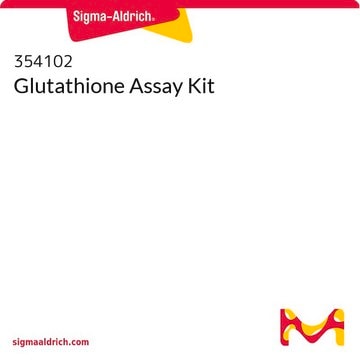Wszystkie zdjęcia(1)
Key Documents
MAK440
Glutathione GSH/GSSG Assay Kit
Sufficient for 100 colorimetric tests
Synonim(y):
GSH/GSSG Ratio Kit
Zaloguj sięWyświetlanie cen organizacyjnych i kontraktowych
About This Item
Kod UNSPSC:
12161503
NACRES:
NA.84
Polecane produkty
Poziom jakości
Zastosowanie
pharmaceutical
metoda wykrywania
colorimetric
powiązane choroby
Alzheimer′s disease; Parkinson′s disease; cancer; neurological disorders; aging/geriatric diseases
temp. przechowywania
−20°C
Opis ogólny
Glutathione (GSH), composed of the amino acids glycine, glutamic acid, and cysteine, serves as a fundamental antioxidant within the body, playing a pivotal role in cellular defense against oxidative stress caused by reactive oxygen species (ROS). As the major free thiol in cells, GSH is instrumental in various biological processes, including the detoxification of harmful substances, the removal of hydroperoxides, and the maintenance of protein sulfhydryl groups in their reduced state. GSH achieves this by directly reducing disulfide bonds in cytoplasmic proteins to cysteines, during which it is transformed into its oxidized form, glutathione disulfide (GSSG). This cycle between reduced and oxidized forms is critical for maintaining the cellular redox balance.Glutathione functions as a cofactor for several key antioxidant enzymes, enhancing their ability to neutralize free radicals. It also plays a crucial role in the regeneration of vitamins C and E, thereby contributing to their antioxidative effects. Beyond its antioxidant properties, GSH is vital for mitochondrial function and the integrity of mitochondrial DNA (mtDNA), which is essential for energy production and cellular health. Dysregulation of glutathione levels is associated with the pathogenesis of several neurodegenerative diseases such as Alzheimer′s, Parkinson′s, and Huntington′s diseases, as well as other health conditions including cystic fibrosis, immune disorders, and cardiovascular diseases. Glutathione′s role in metabolism and cellular protection is extensive, influencing cellular proliferation, apoptosis, and overall physiological stability.
Zastosowanie
The Glutathione GSH/GSSG Assay Kit may be used for:
- Cancer Research
- Diabetes Research
- Neurodegenerative Disease Research
Cechy i korzyści
Sensitive Detection Range: Detect Glutathione levels accurately across a wide range, from 0.01 µM to 3 µM, using only 25 μL of sample in a 96-well plate setup, ensuring highly sensitive analysis with minimal sample requirement.
Simplified Process: Experience a streamlined process with the addition of only a single working reagent and a 10 minute room temperature reaction, reducing complexity and saving valuable time and effort.
Compatibility with High-Throughput Systems: Easily incorporate our kit into high-throughput handling systems, ensuring smooth and accurate processing, enhancing efficiency in your laboratory workflow.
Simplified Process: Experience a streamlined process with the addition of only a single working reagent and a 10 minute room temperature reaction, reducing complexity and saving valuable time and effort.
Compatibility with High-Throughput Systems: Easily incorporate our kit into high-throughput handling systems, ensuring smooth and accurate processing, enhancing efficiency in your laboratory workflow.
Przydatność
The kit is suitable for the quantitative determination of reduced and oxidized glutathione (GSH/GSSG) in whole blood, plasma, serum, urine, tissue and cell extracts.
Zasada
The Glutathione GSH/GSSG Assay Kit is designed to accurately measure total, reduced and oxidized glutathione in biological samples using an enzymatic method that utilizes Ellman′s Reagent (DTNB) and glutathione reductase (GR). DTNB reacts with reduced glutathione to form a yellow product. The rate of change in the optical density, measured at A412 nm, is directly proportional to the glutathione concentration in the sample. This kit can also be used to measure oxidized (GSSG) by using a specific protocol which first scavenges all GSH with 1-methyl-2-vinylpyridinium triflate.
Inne uwagi
For additional information on our range of Biochemicals, please complete this form.
This page may contain text that has been machine translated.
Kod klasy składowania
10 - Combustible liquids
Temperatura zapłonu (°F)
188.6 °F
Temperatura zapłonu (°C)
87 °C
Certyfikaty analizy (CoA)
Poszukaj Certyfikaty analizy (CoA), wpisując numer partii/serii produktów. Numery serii i partii można znaleźć na etykiecie produktu po słowach „seria” lub „partia”.
Masz już ten produkt?
Dokumenty związane z niedawno zakupionymi produktami zostały zamieszczone w Bibliotece dokumentów.
Nasz zespół naukowców ma doświadczenie we wszystkich obszarach badań, w tym w naukach przyrodniczych, materiałoznawstwie, syntezie chemicznej, chromatografii, analityce i wielu innych dziedzinach.
Skontaktuj się z zespołem ds. pomocy technicznej



